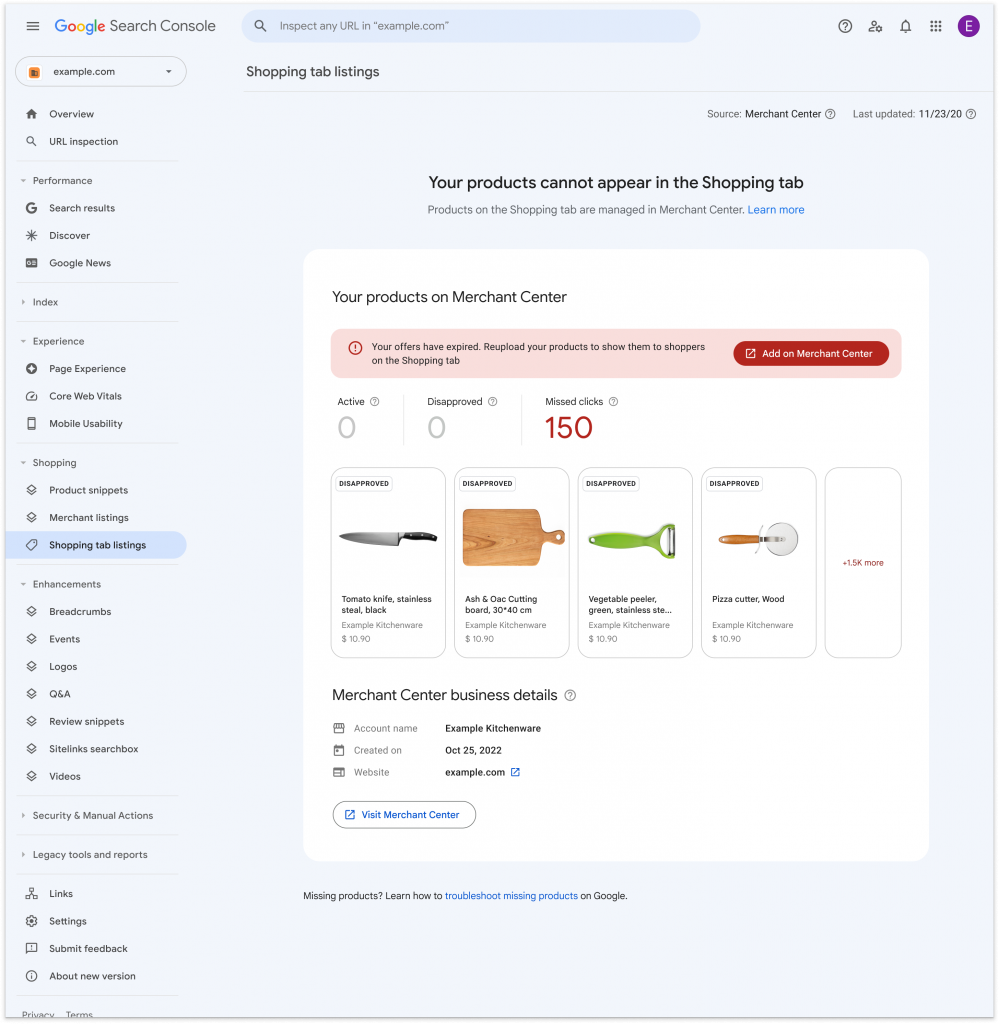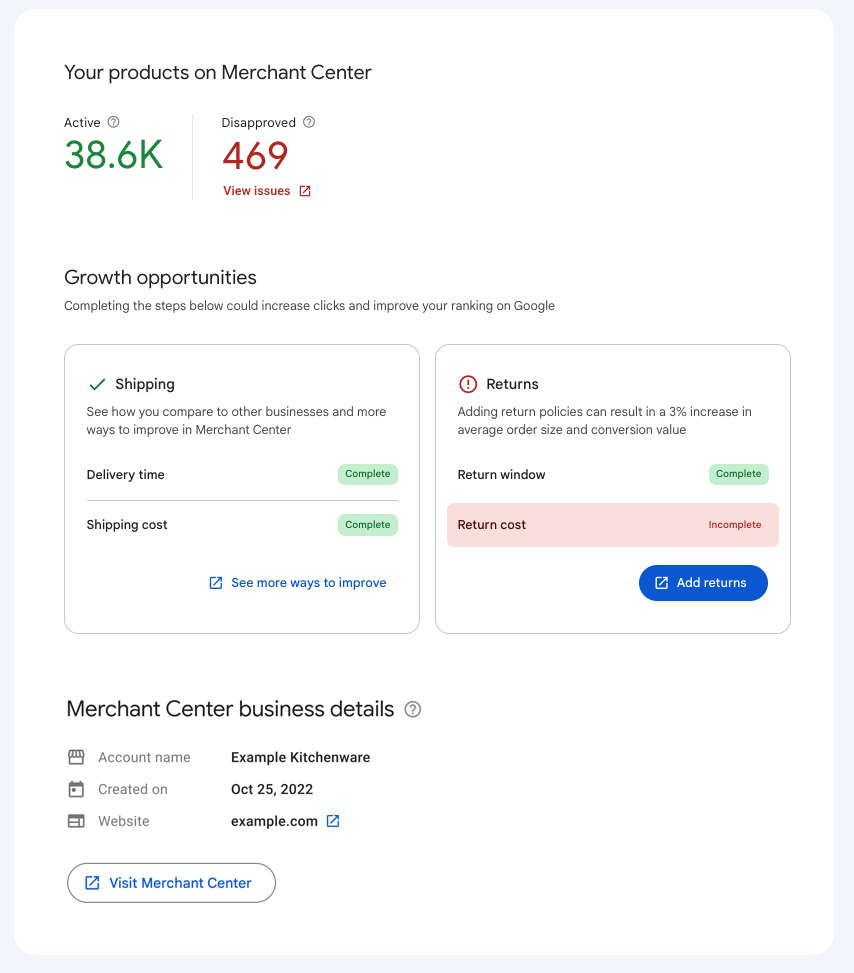Someone wake up the Green Day guy because September has officially ended, and with it comes a plethora of digital marketing updates across SEO and PPC. In this blog, we’ll be covering all the good stuff including:
- SEO Market Updates: From September 2023 helpful content update to Google-Extended.
- PPC Market Updates: including Google’s Misleading Representation Policy update and AdSense’s new tools.
SEO Market Updates
Google August 2023 Core Update Rolls Out
Starting on the 22nd of August, the latest core algorithm update rolled to completion on the 7th of September, taking 16 days.
This algo update marks the second of the year with the previous one introduced in March.
As always, there’s no quick fix if you’re seeing a negative impact on your rankings. Brush up on Google’s latest recommendations and best practices and reassess the quality of your site’s content.
New Merchant Center Integrated Reports Added to Search Console
Two new reports can now be found within the Shopping tab listings section of Google Search Console to help merchants better understand the visibility of their products.
The first of the new reports shows issues relating to products not showing in the Google Shopping tab. If a product stops showing, the report will serve you a notification, similar to how Google Merchant Center works but directly within Search Console. Here’s what it looks like:

The second demonstrates how well your product is ranking within Google Search, and offers opportunities to increase clicks and visibility. Take a look:

With peak shopping season on the horizon, this suite of tools will be your best friend for making sure your e-commerce store performs to its full potential across Black Friday and Christmas so dig in.
How-to Rich Results Stop Showing on Desktop
In last month’s blog, we covered how Google is reducing the visibility of How-to rich results. Google certainly reduced the visibility by stopping showing this SERP feature altogether on desktop.
In an update blog, John Mueller said:
“Continuing our efforts to simplify Google’s search results, we’re extending the How-to change to desktop as well. As of September 13, Google Search no longer shows How-to rich results on desktop, which means this result type is now deprecated.
“This change will be visible in the metrics for the How-to search appearance in the performance report, and in the number of impressions reported in the How-to enhancement reports. Since How-to results no longer appear in Google Search, we will be dropping the How-to search appearance, rich result report, and support in the Rich results test in 30 days. To allow time for adjusting your API calls, support for How-to in the Search Console API will be removed in 180 days.”
If your site relies on traffic coming from How-to rich results, I wish I had some good news for you, but it looks like now is the right time to apply some new organic tactics.
September 2023 Helpful Content Update Rolls Out
Google dropped its first helpful content update of the year in September. The update started on the 14th of September and was fully rolled out by the 28th.
The helpful content system exists to target “content that seems to have been primarily created for ranking well in search engines rather than to help or inform people.”
“What’s new?” I hear you ask:
- Improved classifier
- “written by people” has been removed from the help document
- Google recommends to self-assess your content
- Content should be reviewed by experts
- Dates of content should not be changed unless they receive a significant update
- Don’t blindly add or remove content
As always, these updates can be volatile and if you’re seeing your rankings tank across the board, it’s probably worth reading up on Google’s best practices and assess whether your content is up the scratch. If you need help with this, our experts at Fusion Unlimited would be happy to help.
Links Are Not A Top 3 Ranking Factor
Make sure to check in on your fellow link builder today. During an AMA with Google’s Gary Illyes at Pubcon Pro in Austin, it was revealed that links may not be as important as first thought.
Going back to 2016, Google’s Andrey Lipattsev said that backlinks were in the top three ranking factors. However, now it seems that the importance of links is ‘overestimated’.
During the panel, Illyes was asked if he thought links still belonged within that top 3 classification to which he responded: “I think they are important, but I think people overestimate the importance of links. I don’t agree it’s in the top three. It hasn’t been for some time.”
He also added that it’s “possible to rank without links”, referencing a site that had zero links but ranked consistently for number one spots due to its content being outstanding.
If for whatever reason you’re pumping more hours into your link-building and neglecting your content schedule, perhaps it is time to reassess your site’s priorities and get that content moving.
Google Introduces Google-Extended
September saw the introduction of a new Googlebot, called Google-Extended, that allows site owners to control whether their content can be used to improve Google’s AI suite, including Bard and Vertex AI.
If you wouldn’t like Bard to use your content, you can specify with the Google-Extended agent within your robots.txt.
Google-Extended won’t be used to crawl your site, however, it will send a signal to Google not to use your content for Bard or any other Google AI projects.
Google describes the bot as a “standalone product token that web publishers can use to manage whether their sites help improve Bard and Vertex AI generative APIs, including future generations of models that power those products.”
PPC Market Updates
URL Contains Targeting Added to Performance Max
Performance Max (PMax) received an update in September, allowing URL Contains targeting functionality.
The feature lets you manually specify which URL to display your PMax ads to, allowing further management of how your campaigns are served in order to reach a more relevant audience.
Speed Up Site Verification With Google AdSense’s New Tools
Two new features found their way to Google AdSense in September, making site ownership verification a breeze:
- Real-time site ownership checks: allows users to verify that they’re the site owner in – if you can believe it – real-time when you add a new site in AdSense.
- New site verification method: a new verification method called ‘meta tag’ has been added. You can use ‘meta tag’ as an alternative to the AdSense code snippet if you don’t want to show ads on your homepage.
There are also improvements to ads.txt with a new “last crawled” date and time added so you can see when AdSense last checked your ads.txt file. You can also now ask AdSense to recheck your ads.txt file with the new Check for updates button.
New Report Launched to Flag Checkout Issues on E-commerce Sites
A new report was launched by Google in September to help brands identify checkout problems with their e-commerce sites.
The Checkout journey, as the name suggests, shows the journey a user makes on your e-commerce site by showing the count and percentage of users who initiated checkout.
Using a closed-funnel approach, the report concentrates on users who began at the initial step but didn’t make it to another step in the funnel.
This is a valuable piece of kit for locating bottlenecks in your site’s checkout process and will help you find and resolve any issues during the journey.
The report can be found within Google Analytics by selecting Reports in the left menu. On the left, in the Monetization topic of the Life cycle collection or the Drive online sales topic of the Business objectives collection, open the Checkout journey report.
Automatically Created Assets Rolled Out to all Advertisers
Google rolled out automatically created assets (ACA) for general availability in September. Previously this was in open beta and was only available for advertisers running campaigns in English.
Now ACA is available in seven more languages:
- Dutch
- French
- German
- Italian
- Japanese
- Portuguese
- Spanish
This campaign-level setting allows users to enhance the relevance of Search ads by using the context of your ad and generating custom headlines and descriptions.
This means that ACAs could boost the relevance of your campaign by matching ads to landing pages. However, you’re leaving Google’s AI in control of your campaign’s message which might not be suitable for all brands.
Google to Update its Misleading Representation Policy
Looking ahead to November, Google Ads will be updating its Misleading Representation policy.
The update will remove non-fulfillment of a product or service due to lack of qualifications. The planned update will take effect on 21st November 2023.
Google said: “On that date, non-fulfillment and non-delivery of products or services due to a lack of qualifications will be enforced upon under the Unacceptable business practices policy.”
Google reminded us that they take these violations “very seriously and consider them egregious”. If Google finds any violations of this policy, your Google Ads accounts will be suspended “without prior warning” and you won’t be allowed to advertise with Google again – so tread carefully out there.
However, if you feel there has been a mistake, you can always submit an appeal and plead your case.
Has the Helpful Content Update Not Been Helpful to Your Rankings?
We understand that this might be a volatile time for your site and it’s not always easy to claw back your online visibility following a helpful content update. If your brand needs some help steering the ship back in the right direction, give us a friendly hello and we’d be happy to help.
by Jack Bell






